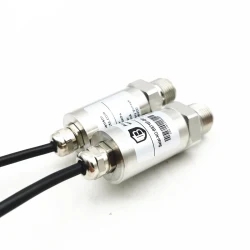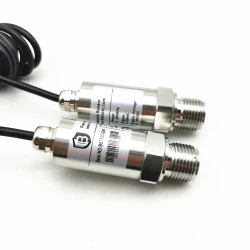





A cryogenic pressure transducer, or sensor as it is otherwise known, is a device for measuring and keeping track of pressure in a frigid environment. It has been tailor-made to work optimally and deliver precise results in temperatures that can get close to zero Kelvin (-273.15 degrees Celsius). The advantages of this sensor include its small size, high accuracy, quick response time, imperviousness to corrosion and remarkable durability. It is suitable for use with gases like oxygen and liquids such as nitrogen, hydrogen and helium.
Cryogenic Pressure Transducers by Kaidi Sensors are used frequently across various industries, such as aerospace, science research and cryogenic engineering. Their purpose is to precisely measure pressure in cryogenic systems. Constructed with materials that are capable of enduring harsh temperatures, they provide excellent performance with great accuracy and repeatability, even in dynamic operating conditions often seen in rocket construction and interstellar exploration. A temperature range of -196°C to +150°C is supported.
Designing cryogenic pressure sensor involves addressing the effects of temperature on the sensing elements and electronics. The low temperatures can cause material contraction, affecting the accuracy and calibration of the transducer. In order to minimize these effects, materials with low coefficients of thermal expansion and high thermal conductivity are selected.
Depending on the accuracy, sensitivity, and temperature range required, cryogenic pressure sensor may use strain gauges, piezoelectric crystals, or capacitance-based sensors to measure pressure.
The quality assurance program ensures that the product is in compliance with the international quality standards. This product consumes little energy thanks to its energy-saving technology.
Overall, cryogenic pressure transducers play a crucial role in ensuring the safe and efficient operation of cryogenic systems by providing accurate pressure measurements even under extreme low-temperature conditions.


| Application: | water plants, oil refineries, sewage treatment plants, building materials, light industry, machinery |
|---|---|
| Measuring Range: | auge pressure (G)-maximum (0~60) MPa, minimum (0~0.5) KPa; |
| Protection Grade: | IP65 |
| Accuracy: | 0.1%F•S,0.25%F•S,0.5%F•S |
| Process Temperature: | -40℃~80℃ |
| Process Connection: | M20×1.5 external thread or user specified |
| MOQ | 1 SET |
| Payments: | TT, Paypal, Credit card, Western union |
| Shipping ways: | Express(DHL,Fedex,TNT,EMS,UPS)/Air/Sea |
Pressure transducers are devices that measure the pressure of fluids, indicating the force they exert on surfaces they contact. They can be used to measure flow, air speed, level, pump systems, or altitude.
Cryogenic pressure transducers offer several advantages for measuring pressure in low-temperature environments.
Here are some key advantages of cryogenic pressure transducer:
Precision and Accuracy: These transducers provide precise and accurate measurements of pressure. They can be calibrated and adjusted to ensure high measurement accuracy, making them suitable for critical applications.
Temperature Stability: Even at extremely low temperatures, cryogenic pressure transmitter maintain their accuracy and performance. Their materials and components are designed to withstand cold temperatures and minimize the effects of thermal contraction. Temperature stability ensures reliable and consistent pressure measurements in cryogenic systems.
Wide Temperature Range: Cryogenic pressure transducers are capable of operating over a wide temperature range, typically from near absolute zero (-273.15 degrees Celsius) up to higher cryogenic temperatures. This versatility allows them to be used in various cryogenic applications with different temperature requirements.
Durable Construction: Cryogenic pressure transducers are constructed to withstand the extreme conditions of cryogenic environments. Using robust materials, they can resist temperature-induced stress and maintain their structural integrity. This ensures long-term reliability and minimizes the need for frequent maintenance.
Compatibility: Cryogenic pressure transmitters are compatible with a variety of cryogenic gases and liquids commonly used in industrial and scientific settings. In cryogenic systems containing liquefied gases, superconductors, cryostats, and other cryogenic substances, they can be used to measure pressures.
Compact Size: Cryogenic pressure transducers are often compact and lightweight, allowing for easy integration into cryogenic systems without adding significant bulk or weight. Their small size makes them suitable for installations where space is limited.
As a result, cryogenic pressure transducers are essential tools for accurately and reliably monitoring pressure in cryogenic systems, ensuring efficient operation and ensuring safety.
Want to know more, contact Kaidi Sensors, the professional wholesale pressure transducer manufacturers and suppliers.
We are here to help you! If you close the chatbox, you will automatically receive a response from us via email. Please be sure to leave your contact details so that we can better assist